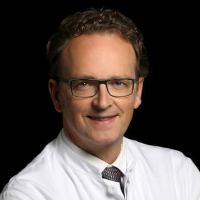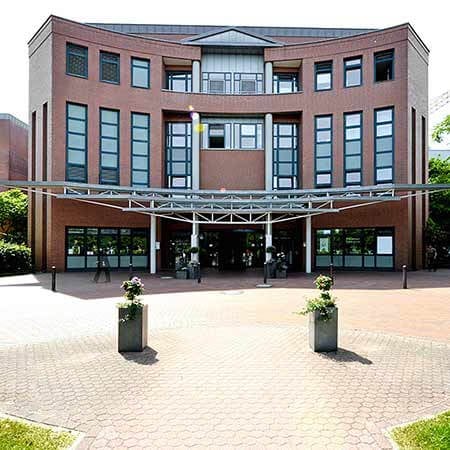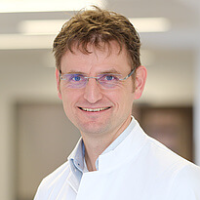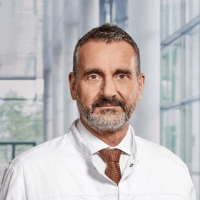Traditional Tricuspid Valve Repair (open-heart Procedure) for Tricuspid Valve Insufficiency treatment
Treatment prices are regulated by national law of the corresponding countries, but can also include additional hospital coefficients. In order to receive the individual cost calculation, please send us the request and medical records.

Department of Cardiothoracic Surgery
According to the Focus magazine, the Department of Cardiothoracic Surgery ranks among the top German medical facilities specializing in the surgical treatment of diseases of the cardiovascular system and lung cancer! The department offers the full range of surgical services for the treatment of diseases of the cardiovascular system, respiratory tract, including heart and lung transplantation, artificial heart implantation. The therapeutic options include aortic surgery, coronary artery bypass grafting, transplantation surgery, surgical treatment of heart rhythm disorders (arrhythmias), minimally invasive surgery, surgical treatment of the heart valves, including reconstructive interventions. All operations are performed using state-of-the-art technology and in accordance with the current recommendations of professional societies.






Department of Cardiac Surgery
The Department of Cardiac Surgery provides a full range of surgical treatment in its area of specialization. Special emphasis is placed on heart valve repair and replacement surgery, coronary artery bypass grafting, thoracic aortic surgery, adult congenital and acquired heart disease surgery, pacemaker and defibrillator implantation, and artificial heart implantation for severe heart failure. Many heart operations are performed using minimally invasive techniques, which has a positive effect on the healing of the surgical wound. Minimally invasive cardiac procedures also reduce surgical risks and contribute to a rapid recovery of the patient in the postoperative period. Surgical treatment of cardiac pathologies is performed in advanced operating rooms equipped with the latest technology. The cardiac surgeons of the department successfully perform routine and complex surgical procedures, saving the lives of thousands of patients. The specialists work in accordance with current clinical protocols and follow the recommendations of the German Society for Thoracic and Cardiovascular Surgery (DGTHG).


Department of Cardiothoracic Surgery and Vascular Surgery
The Department of Cardiothoracic Surgery and Vascular Surgery provides effective surgical treatment for diseases of the heart, respiratory system, and blood vessels. The team of cardiac surgeons operates on patients with heart valve pathologies, coronary heart disease, heart failure, and heart rhythm disturbances. In the field of thoracic surgery, the key focus is on the surgical removal of lung tumors and lung metastases. The specialists in this area also perform surgery to repair chest wall deformities. In the field of vascular surgery, interventions for abdominal and thoracic aortic aneurysms are most often performed here. The department's vascular surgeons are also exceptionally competent in the treatment of peripheral occlusive arterial disease. A great advantage for the department's patients is that almost all surgical interventions are performed using minimally invasive techniques, so there is no need for a long postoperative recovery. The department's operating rooms are equipped with state-of-the-art technology. This allows for effective and safe treatment. The priority is always personalized medical care for patients.






Tricuspid valve surgery is complex and unsafe. Doctors often need to repair several heart valves at once or treat multiple heart conditions. Many patients already have heart failure, arrhythmia, or chronic diseases of other internal organs at the time of surgery or a medical procedure.
Doctors in developed countries, however, successfully cope even with such complex cases. You can undergo your treatment abroad to expect good, reliable results, symptom relief, and freedom from revision surgical repair. You are welcome to use the Booking Health website to find out the cost of treatment at the best hospitals abroad. On our website, you can make an appointment for your operations and procedures at specialized hospitals for your preferred dates.
Content
- What is tricuspid regurgitation?
- Who may be a candidate for open tricuspid valve repair?
- How is heart surgery for tricuspid valve insufficiency performed?
- Why to undergo your tricuspid valve insufficiency treatment abroad?
What is tricuspid regurgitation?
Tricuspid regurgitation (insufficiency) is a common heart defect, but it is rarely isolated. The disease often develops due to mitral valve defects, most often due to mitral valve insufficiency.
The tricuspid valve of the heart separates the right atrium and ventricle. It is the largest valve in the human heart. It usually has three leaflets, hence the name, but some people may have 2 to 6 leaflets. The valve blocks the flow of blood in the opposite direction (from the ventricle to the atrium). However, in cases of insufficiency, its function is impaired. The more severe the tricuspid insufficiency, the more blood is thrown back into the atrium instead of entering the pulmonary circulation.
In 90% of cases, regurgitation is associated with the fibrous ring enlargement. In this case, the heart valve remains normal. This form of regurgitation is called secondary. The condition is caused by heart diseases that enlarge the cavities of the right ventricle and atrium (mitral defects, coronary heart disease, and dilated cardiomyopathy). Only 10% of cases of tricuspid regurgitation are in the primary form, which is associated with damage to the valve leaflets. Possible causes are rheumatism, infective endocarditis, heart surgery, congenital heart disease, heart tumors, and radiation therapy.
Who may be a candidate for open tricuspid valve repair?
Tricuspid valve surgery is unsafe, and therefore patients with tricuspid regurgitation rarely undergo open repair surgery. Doctors strive to control tricuspid valve disease through drug therapy whenever possible.
Indications for tricuspid valve repair include:
- severe tricuspid regurgitation;
- mild to moderate tricuspid regurgitation if the annulus diameter is more than 7 cm intraoperatively or more than 4 cm when measured during echocardiography;
- development of right heart failure.
It is advisable to perform tricuspid valve repair before the development of right ventricular dysfunction because many changes in the heart are irreversible.
When treating heart disease, doctors decide which surgery option to choose: tricuspid valve repair or replacement surgery. In developed countries, about 90% of operations are for repair and only 10% for replacement. In addition, in recent years, leading hospitals have begun to perform minimally invasive procedures for tricuspid valve repair. Such procedures are still rarely performed. These are mainly offered to patients at high surgical risk who have contraindications for an open-heart procedure.
How is heart surgery for tricuspid valve insufficiency performed?
Heart valve repair surgery is preferable to valve replacement. It provides patients with a lower risk of complications and better hemodynamics. Considering that in 90% of cases, the pathology is associated with fibrous ring enlargement, the main goal of the tricuspid valve repair is usually to reduce its area.
Open surgery is performed under general anesthesia through a chest incision using a heart-lung machine. During the surgical intervention, doctors perform a suture annuloplasty or the implantation of a support ring. The second option is considered more effective, which is why it is used in the world's leading hospitals specializing in heart valve repair. Plastic repair with a support ring restores not only the normal area but also the proper shape of the tricuspid valve, which has a positive effect on hemodynamics. Furthermore, the recurrence of tricuspid regurgitation is reduced. For this reason, the DeVega annuloplasty, described in 1972, is gradually becoming a thing of the past.
The annulus fibrosus is dynamic and, therefore, changes shape throughout the cardiac cycle. Its diameter is usually 30-35 mm and depends on the size of the body. The septal part of the annulus is fixed, and the dilatation of the annulus occurs on the free wall. For this reason, the size of the annuloplasty ring depends on the size of the base of the septal leaflet. The ring must be properly shaped to accommodate the anatomy specific to the patient's tricuspid valve. Rings can be rigid or flexible. Each option has its own pros and cons. Some studies show that rigid rings can help reduce the risk of tricuspid valve regurgitation recurrence.
Another feature of this heart surgery is the close location of the heart conduction system, which is localized mainly in the right half of the heart. It is important to avoid damaging it. Otherwise, heart rhythm disorders, that is, arrhythmias, will occur. Even in developed countries, the frequency of pacemaker implantation after tricuspid valve surgery is quite high. It is 17% for replacement surgery and 11% for repair surgery.
Why to undergo your tricuspid valve insufficiency treatment abroad?
You can undergo your treatment abroad to expect the best results with minimal health risks. There are a few reasons for you to seek medical attention at one of the hospitals abroad. These are the following:
- you will be treated by highly qualified doctors with a worldwide reputation;
- modern Heart Surgery Centres outfitted with cutting-edge technology;
- plastic repair with support rings of individual sizes instead of an outdated suture annuloplasty;
- surgeons achieve good results from heart surgery with complete restoration of tricuspid valve function or with minimal residual regurgitation, which does not significantly affect hemodynamics;
- several heart defects, most commonly mitral and tricuspid valve regurgitation repair, can be treated at the same time;
- several heart diseases, such as tricuspid valve repair with coronary artery bypass grafting, can be treated concurrently;
- successful treatment of tricuspid valve diseases even in complex cases accompanied by endocarditis, in combination with stenosis, with multiple valvular defects, concomitant heart diseases, and revision repair after previously performed heart surgery;
- high-quality care, full rehabilitation, and comfortable conditions at medical centers abroad.
You are welcome to use the Booking Health service to find out prices and compare the cost of treatment at different hospitals. When you make an appointment through Booking Health, the cost of treatment for you will be lower than when you contact the medical center directly. Prices are reduced due to the absence of additional taxes for foreign patients. When you make an appointment for your treatment abroad through Booking Health, the cost of treatment for you will not increase after the start of your medical care program because you will receive insurance that will protect you against unexpected medical expenses.
The medical tourism agency Booking Health will take care of all the arrangements for your treatment abroad. We will select a hospital that specializes in operations and procedures for heart valve repair. Our specialists will contact the hospital administration and schedule an appointment for you on the dates you specify. We will also purchase airline tickets, book the nearest hotel to the hospital, and translate your medical records. Our company's employees will meet you at the airport, provide interpreting services, and take you to the hospital by car. After the completion of your treatment, we will organize your return transfer.
Authors:
The article was edited by medical experts, board-certified doctors Dr. Nadezhda Ivanisova and Dr. Vadim Zhiliuk. For the treatment of the conditions referred to in the article, you must consult a doctor; the information in the article is not intended for self-medication!
Sources:
European Society of Cardiology

